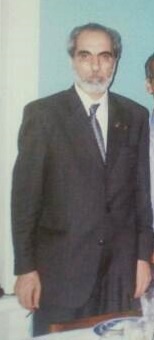On 9 June 1993, as rebellious troops were advancing onto Baku, President Elchibey invited Heydar Aliyev, former Soviet Politburo member and then head of Nakhchivan (and no relation to Elchibey, whose real surname was Aliyev), to Baku for negotiations with Surat Huseynov. Aliyev quickly took control of the power, becoming the Chairman of the Azerbaijani parliament on 15 June 1993 and offering the prime ministership of the country to Huseynov. Nine days later, in the vacuum of power left by Elchibey's departure to Nakhchivan, Aliyev constitutionally assumed presidential powers in his capacity as parliament speaker. He signed the Bishkek Protocol to cease hostilities on the frontline, and further solidified his power by organizing impeachment hearings and holding a national referendum on 29 August 1993, which formally stripped Elchibey of the presidency.
In another national election, on 3 October 1993, Heydar Aliyev was elected as president of Azerbaijan with 99% of the votes. [25]
Post-presidency and death

During Aliyev's presidency, Elchibey returned to Baku in 1997 and joined the opposition as the leader of Azerbaijani Popular Front Party.
In 2000, Elchibey was diagnosed with prostate cancer and died in August of the same year in a military hospital in Ankara, Turkey. His body was flown to Baku and given the state funeral at the Alley of Honor with special attendance by then-President Heydar Aliyev.
The Elchibey Institute in Azerbaijan was created on 17 November 2020 in Baku with the aim to promote the national ideology and policies of Elchibey.
See also
References
- ↑ "Abulfaz Elchibey – president of Azerbaijan" . Retrieved 12 July 2017.
- 1 2 3 4 5 6 Altstadt, Audrey L. (1997), Parrott, Bruce; Dawisha, Karen (eds.), "Azerbaijan's struggle toward democracy", Conflict, Cleavage, and Change in Central Asia and the Caucasus, Democratization and Authoritarianism in Post-Communist Societies, Cambridge University Press, pp. 110–155, ISBN 978-0-521-59731-9
- ↑ Cornell, Svante E. (2015). Azerbaijan Since Independence. Routledge. p. 78. ISBN 978-1-317-47620-7.
The evidence that Surat Husyenov's coup was engineered in Moscow is as incontrovertible as it gets.
- ↑ Ottaway, Marina (2003). Democracy Challenged: The Rise of Semi-Authoritarianism. Carnegie Endowment for International Peace. pp. 56–57. doi:10.2307/j.ctt1mtz6c5. ISBN 978-0-87003-195-3. JSTOR j.ctt1mtz6c5.
- ↑ Gasimov, Zaur (2022). "Observing Iran from Baku: Iranian Studies in Soviet and Post-Soviet Azerbaijan". Iranian Studies. 55 (1): 52. doi:10.1080/00210862.2020.1865136. S2CID 233889871.
- ↑ Waal, Thomas de (2013), "Black Garden: Armenia and Azerbaijan through Peace and War", Black Garden, New York University Press, p. 87, doi:10.18574/nyu/9780814770825.001.0001, ISBN 978-0-8147-7082-5
- ↑ Cohen, Ronen A.; Lev, Tzvi (2021). "A Triangle of Interests: Azerbaijan, Iran and Israel". Iran and the Caucasus. 25 (1): 84. doi:10.1163/1573384X-20210108. S2CID 236630765.
Strongly anti-Iran, Elchibey supported a pro-Western foreign policy, called for Iran's Turkophone population to unify with Azerbaijan, and accused the Islamic Republic of fomenting a religious revival among his country's Shi'ites.
- ↑ "Abulfaz Elchibey". 23 August 2000. Retrieved 12 July 2017.
- ↑ Cornell, Svante E. (2015). Azerbaijan Since Independence. Routledge. p. 52. ISBN 978-1-317-47620-7.
- ↑ (in French) "Les liaisons dangereuses de la police turque", Le Monde diplomatique , March 1997
- ↑ Чернявский, Станислав (2002). Новый путь Азербайджана (in Russian). Азер-Медиа. ISBN 9785212009164.
- ↑ "Baroness Thatcher in Baku". Visions of Azerbaijan Magazine.
- ↑ "Thatcher in Baku: How BP broke into Azerbaijan". platformlondon.org. 13 September 2012.
- ↑ "Pipe Dreams – The Struggle for Caspian Oil". The Washington Post.
- ↑ "Абульфаз Эльчибей: 82 года борцу за свободу Азербайджана". www.aa.com.tr. 24 June 2020.
- ↑ "Thousands turn out for funeral of Turkish President Ozal".
- ↑ Cornell, Svante (1 December 2000). Small Nations and Great Powers: A Study of Ethnopolitical Conflict in the Caucasus. Taylor & Francis. ISBN 9780203988879 . Retrieved 29 September 2016– via Google Books.
- ↑ Дмитрий ФУРМАН, Али АБАСОВ. "Азербайджанская революция". Sakharov-cente. Archived from the original on 21 February 2011.
- ↑ Д. Фурман. Возвращение в третий мир. Грустная история про азербайджанскую демократию (рус.) // Свободная мысль. — 1993. — № 11. — С. 25.
- ↑ "Подписан двусторонний договор". Газета «Коммерсантъ». 13 October 1992.
- ↑ Cornell, Svante (1 December 2000). Small Nations and Great Powers: A Study of Ethnopolitical Conflict in the Caucasus. Taylor & Francis. ISBN 9780203988879 . Retrieved 28 September 2018– via Google Books.
- ↑ Alaolmolki, Nozar. Life After the Soviet Union. published in 2001 page 50.
- ↑ "Визит Абульфаза Эльчибея в Киев". www.kommersant.ru. 11 December 1992.
- ↑ "Эльчибей поехал в Киев". www.kommersant.ru. 10 December 1992.
- ↑ International Foundation on Election Systems (April 1994). "Elections Today". Elections Today. 4 (Number 2-3): 28. ISSN 1073-6719.
Abulfaz Elchibey | |
|---|---|
Əbülfəz Elçibəy | |
 | |
| 2nd President of Azerbaijan | |
| In office 17 June 1992 –24 June 1993 |
